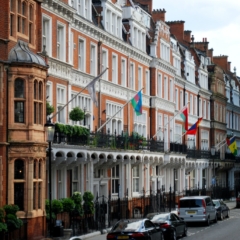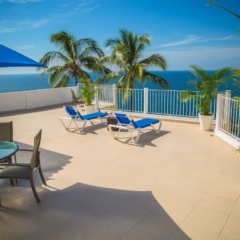Spanish Non-Lucrative Visa and Digital Nomad Visa – Interview with Tarragona Legal

The Spanish Non-Lucrative Visa (NLV) and the most recent Digital Nomad Visa (DNV) are two visas that allow non-European citizens to come to live in Spain legally. Both visas attract a lot of attention, and with it, come doubts. To make this process easier, I invited Marc Ferreres, Spanish lawyer from Tarragona Legal, and he kindly accepted to help clarify the most common doubts regarding both NLV and DNV. He writes in clear English, goes straight to the point and avoids legal jargon. 😉 Tarragona Legal works online and helps migrants inside and outside of Spain with their Spanish documentation. Check our interview below, right after the basics.
The basics for both NLV and DNV
The Non-Lucrative Visa is a visa for those who can afford to live in Spain without working. It is a visa for either retired people or those who can afford the non-working clause, either by proving they have enough funds in the bank or by proving they have enough non-work-related income, from pensions, rentals, investments, etc.
The Digital Nomad Visa is a visa for those who do remote work. The emphasis here is on proving the link between the DNV applicant and the company for which he or she works, be it as an employee or as a self-employed individual. In this last case, the DNV applicant would need to prove he or she has a contract to provide services to other companies, even if not as an employee.

The starting point for either visa is the Consulate (or Embassy) of Spain that serves the area where you live. Check the post where we help finding the institution that covers your area, if you don’t know yet what Consulate of Spain you should go to. Once you know it, check on their page the requisites for the visas (it will be under servicios consulares / consular services). There is a lot of information, and it is possible that there are small variations in the requisites from one Consulate of Spain to another.
As an example and starting point, I’ll link here the pages of the Consulate of Spain in London for both visas:
Consulate of Spain in London – Non-Lucrative Visa
Consulate of Spain in London – Digital Nomad Visa
Now let’s get to it!
Interview with Marc Ferreres

Marc Ferreres is a Spanish lawyer specialized in immigration to Spain. He studied in Barcelona and is one of the founders of Tarragona Legal, a law firm that works 100% online, both in Spanish and English. He answered some common doubts regarding both the Non-Lucrative Visa (also known as non-working visa or, in Spanish, visado de residencia no lucrativa) and the Digital Nomad Visa (in Spanish, visado de residencia para teletrabajo). His answers are in italic, my comments are in brackets.
Non-Lucrative Visa – NLV
The NLV is ideal for retired people who want to spend long periods in Spain and take advantage of the country’s good climate, as well as for long-term travelers who want to know our culture, ancient heritage and rich gastronomy.
How long does the NLV processing take?
It is variable. There are two deadlines. One is the time it takes for the interested party to gather the documentation, such as criminal records or medical certificates. Afterwards, there is the Consulate of Spain, which has 3 months to conclude the processing. (in Spain, you have to be patient with administrative procedures). If you also wish to get the TIE ahead of moving, add another month.
Are there any restrictions on who can apply to the NLV, such as nationality or age restrictions?
There are not many restrictions. People of all ages and from any country outside the European Union can apply for the NLV. The EU citizens don’t need it. The main dividing line is the bank account, since the economic means that we have to justify are not low; in January 2024 we are talking about almost €30,000 annually. So, there are 2 types of people: those who can afford the NLV and those who cannot.
Is there any official source where we can verify the IPREM?
The IPREM is an amount of money that is used as a reference to calculate access to social aid, scholarships and subsidies. And to establish scales, as is the case of the NLV. We can consult it on the official website https://www.iprem.com.es/ . In January 2024 the IPREM is €600 per month.
What happens after the NLV expires? Can it be renewed from within Spain? And can it be exchanged for a residence permit that allows working?
The best is to not let the NLV expire, so we do not stay irregularly in Spain. The deadline to renew it is long, from 60 days before expiration to 90 days after. We can do it from Spain but also from any other part of the world because it can be presented online.
The NLV can be renewed for another NLV but also for a work permit. There are people who come to get to know and enjoy Spain for a while, or have taken a sabbatical, and then want to work again. In those cases, we can renew the NLV for an employed work permit. To obtain it, a job offer is necessary. We can also exchange the NLV for a self-employed work permit. Here we need a business project and to be able to guarantee the payment of the investment, if there is one. There are also other options, such as the investor visa or the Golden Visa.
Does your company help with the preparation to apply for a NLV?
Yes. The advantage of having a lawyer is that he already knows the process. This helps you save time but also avoid mistakes that delay getting the visa. At TarragonaLegal, as an online immigration office, we offer this service to people located anywhere in the world, as well as for any other type of residence and work permit they need.
NLV and residence permit
It is important to notice that NLV and residence permit are two different things. Once you have the NLV, you can legally live in Spain, but you still need to apply for residence permit – TIE – once you arrive in Spain. The NLV itself is valid for 3 months only; in the first month of this time, you have to apply for a residence permit.
The residence permit obtained after arriving in Spain with the NLV will be valid for 1 year. It can be extended (as an NLV) for up to 4 more years in a row (in one process only, not in a yearly process) provided you keep meeting residence requirements at the moment of requesting the extension. It can also be exchanged for other type of residency, as Marc Ferreres explained.
After these 5 years have passed, you’ll need one more renewal. This time, though, you can ask for a permanent residence permit, which will grant access to the Spanish healthcare system and other benefits, such as being able to work in Spain.
To keep residence rights, the NLV holder should not leave Spain for more than 6 months in a year or a total of 10 months during the first 5 years living in Spain.
Digital Nomad Visa – DNV
The DNV seems to me to be one of the most interesting permits that exist today in Spain because it attracts a very educated public, with a very open mind and who has traveled and learned about other cultures. The digital nomad reminds me of that photograph of a person on the beach, with a caipirinha, working from the laptop. [it makes me think of that too!]
Who can apply for this Visa?
It can be applied for by people from outside the European Union (EU) who work remotely, as an employee or as a self-employed person, with an activity mainly outside Spain. At the DNV we once again find an economic frontier, since only those who earn at least 2 times the minimum wage in Spain can apply for it: €2,268 per month. [The minimum wage in Spain in 2024 is €1,134 euros, as per wage indicator].
If a person was successfully approved for the DNV as an employee of a company, could this person change jobs/company and keep the DNV?
One can change jobs and keep the visa if the requirements continue to be met, such as the employer company being outside Spain and the worker continuing to earn the minimum required.
Can the DNV be renewed or exchanged for a residence permit that allows work, after a certain period?
You can change the DNV for other permits, such as the long-term permit when you have been continuously residing in Spain for more than 5 years. In addition, the time of the DNV counts to obtain Spanish nationality.
What else is remarkable about the DNV?
It should be noted that the DNV can be requested either from outside or from within Spain. Besides, you can bring your family with you and they can have a work permit. Furthermore, DNV has tax benefits, as the digital nomad pays less than nationals.
Also remarkable is that there are important colonies of nomads mainly in large cities and areas with better weather. Above all, we find them in Barcelona, Madrid, Valencia, Andalusia and in the Canary Islands.
Does your company help with the preparation of documentation for a DNV?
Yes, at Tarragona Legal we help digital nomads to establish themselves in Spain. You can have more information about us at tarragonalegal.com
Conclusion
While gathering all the necessary documentation and making sure it is correct before submitting it to a Spanish consulate, many doubts may arise. Having qualified help in this process could be of great help, saving time and increasing the chances of a positive outcome.
Be it with a NLV or a DNV, you are a step closer to getting your visa to Spain. Get ready to enjoy that caipirinha, with or without a laptop!

Ah… a caipirinha. Image by Marcelo Verfe on Pexels.







